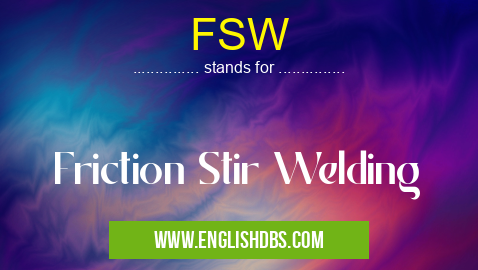What does FSW mean in UNCLASSIFIED
Friction Stir Welding (FSW) is a solid-state processing technique used for welding similar and dissimilar metals. It is an innovative process that uses an external rotating tool to interact with workpieces, creating frictional heat which softens and plasticizes the material at the joint weld while simultaneously stirring it. The end result is a strong, homogenous weldment that often has superior mechanical properties compared to traditional fusion methods such as gas metal arc welding or shielded metal arc welding. FSW is suitable for joining a wide range of materials from aluminum alloys to titanium alloys and even stainless steel. In addition, it offers several advantages over traditional welding techniques including minimized distortion, reduced risk of cracking or porosity during cooling, improved fatigue performance, better corrosion resistance, and faster cycle times.

FSW meaning in Unclassified in Miscellaneous
FSW mostly used in an acronym Unclassified in Category Miscellaneous that means Friction Stir Welding
Shorthand: FSW,
Full Form: Friction Stir Welding
For more information of "Friction Stir Welding", see the section below.
What Does FSW Mean?
FSW stands for "Friction Stir Welding". This process involves using an external rotary tool with a non-consumable shoulder to create heat through friction at the joint interface between two pieces of metal. This results in the material at the weld becoming softened and plasticized while simultaneously being stirred together so that a strong, homogenous weld can be formed. This method has numerous advantages over other forms of welding including reduced risk of cracking or porosity during cooling, improved fatigue performance and corrosion resistance, minimized distortion and faster cycle times.
Essential Questions and Answers on Friction Stir Welding in "MISCELLANEOUS»UNFILED"
What is Friction Stir Welding?
Friction Stir Welding (FSW) is an innovative welding process that combines the plastic deformation of materials with friction heat to join them together. It was invented in 1991 by The Welding Institute (TWI), a leading research and technology organisation based in the United Kingdom. FSW is used in various industries, such as shipbuilding, aerospace, automotive and defence.
How does Friction Stir Welding work?
In FSW, a rotating pin tool is inserted between two pieces of material that need to be joined together. The pin creates friction heat due to its rotation against the surface of the materials while simultaneously applying pressure that causes plastic deformation of the materials, which allows them to bond together.
What are some advantages of Friction Stir Welding?
FSW offers many advantages compared to other welding methods such as increased joint strength, improved weld geometry, reduced distortion and increased weld speeds. FSW also minimises costly pre-weld cleaning operations and welding fumes since it uses no additional filler metal. Overall this makes it more cost efficient than other methods.
What are some disadvantages of Friction Stir Welding?
A potential disadvantage of FSW is that there is limited access for full visual inspection due to the design of the tool itself. It can also be difficult to control parameters such as rotational speed and traverse speed which can adversely affect weld quality if not monitored closely.
What materials can be joined using Friction Stir Welding?
FSW has been applied successfully on a wide range of different metals including aluminium alloys, steels and titanium alloys. With advances in technologies, it has been possible to join dissimilar materials such as steel-aluminium or copper-titanium alloys providing greater flexibility for product designers.
What type of metals cannot be joined using Friction Stir Welding?
Due to its relatively low temperatures during operation, certain metals that would otherwise require higher temperatures for successful joining cannot be effectively welded using FSW. These include nickel-based superalloys and copper-based alloys.
Does Friction Stir Welding produce smoke or fumes?
No - unlike traditional welding processes that use a filler metal which produces smoke when melted off at high temperatures causing air pollution, FSW does not generate any smoke or fumes since no additional filler metal is used.
Can Friction Stir Welding be used to join thin sheets?
Yes - one advantage of FSW is that it can join sheets as thin as 0.25mm thick without any difficulty.
Is Friction Stir Welding a safe process?
Yes - since no additional filler metal is used, there are no harmful emissions generated during the process making it one of safest welding techniques available today.
Is there any post-weld clean up needed after Friction Stir Welding?
No - due to its nature, there are very minimal post-weld operations required such as reworking or grinding which greatly reduces production costs over traditional methods.
Final Words:
Friction Stir Welding (FSW) is an advantageous technology used for joining materials from aluminum alloys to stainless steel which offers several benefits like minimized warping, improved fatigue resistance and increased corrosion protection. As this technique continues to evolve it will become more widely used in many industrial sectors due to its capabilities for quickly joining metals without introducing pores or cracks in the finished product.
FSW also stands for: |
|
| All stands for FSW |
